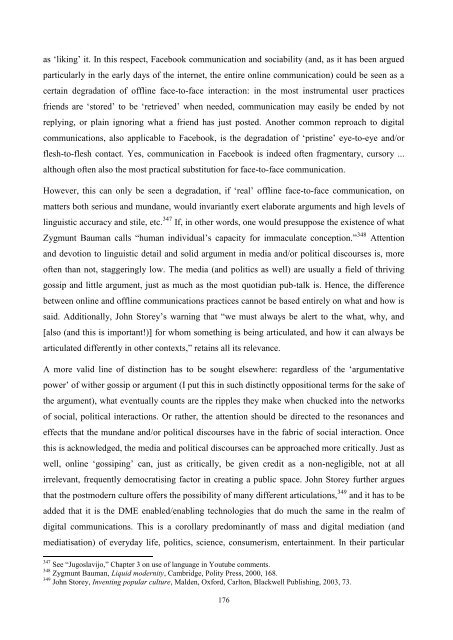UNIVERSITY OF NOVA GORICA GRADUATE SCHOOL ...
UNIVERSITY OF NOVA GORICA GRADUATE SCHOOL ...
UNIVERSITY OF NOVA GORICA GRADUATE SCHOOL ...
You also want an ePaper? Increase the reach of your titles
YUMPU automatically turns print PDFs into web optimized ePapers that Google loves.
as ‗liking‘ it. In this respect, Facebook communication and sociability (and, as it has been argued<br />
particularly in the early days of the internet, the entire online communication) could be seen as a<br />
certain degradation of offline face-to-face interaction: in the most instrumental user practices<br />
friends are ‗stored‘ to be ‗retrieved‘ when needed, communication may easily be ended by not<br />
replying, or plain ignoring what a friend has just posted. Another common reproach to digital<br />
communications, also applicable to Facebook, is the degradation of ‗pristine‘ eye-to-eye and/or<br />
flesh-to-flesh contact. Yes, communication in Facebook is indeed often fragmentary, cursory ...<br />
although often also the most practical substitution for face-to-face communication.<br />
However, this can only be seen a degradation, if ‗real‘ offline face-to-face communication, on<br />
matters both serious and mundane, would invariantly exert elaborate arguments and high levels of<br />
linguistic accuracy and stile, etc. 347 If, in other words, one would presuppose the existence of what<br />
Zygmunt Bauman calls ―human individual‘s capacity for immaculate conception.‖ 348 Attention<br />
and devotion to linguistic detail and solid argument in media and/or political discourses is, more<br />
often than not, staggeringly low. The media (and politics as well) are usually a field of thriving<br />
gossip and little argument, just as much as the most quotidian pub-talk is. Hence, the difference<br />
between online and offline communications practices cannot be based entirely on what and how is<br />
said. Additionally, John Storey‘s warning that ―we must always be alert to the what, why, and<br />
[also (and this is important!)] for whom something is being articulated, and how it can always be<br />
articulated differently in other contexts,‖ retains all its relevance.<br />
A more valid line of distinction has to be sought elsewhere: regardless of the ‗argumentative<br />
power‘ of wither gossip or argument (I put this in such distinctly oppositional terms for the sake of<br />
the argument), what eventually counts are the ripples they make when chucked into the networks<br />
of social, political interactions. Or rather, the attention should be directed to the resonances and<br />
effects that the mundane and/or political discourses have in the fabric of social interaction. Once<br />
this is acknowledged, the media and political discourses can be approached more critically. Just as<br />
well, online ‗gossiping‘ can, just as critically, be given credit as a non-negligible, not at all<br />
irrelevant, frequently democratising factor in creating a public space. John Storey further argues<br />
that the postmodern culture offers the possibility of many different articulations, 349 and it has to be<br />
added that it is the DME enabled/enabling technologies that do much the same in the realm of<br />
digital communications. This is a corollary predominantly of mass and digital mediation (and<br />
mediatisation) of everyday life, politics, science, consumerism, entertainment. In their particular<br />
347 See ―Jugoslavijo,‖ Chapter 3 on use of language in Youtube comments.<br />
348 Zygmunt Bauman, Liquid modernity, Cambridge, Polity Press, 2000, 168.<br />
349 John Storey, Inventing popular culture, Malden, Oxford, Carlton, Blackwell Publishing, 2003, 73.<br />
176

















